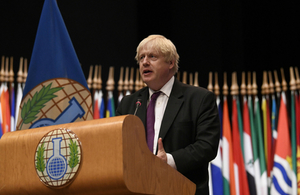Foreign Secretary hails agreement to support ban on chemical weapons
The Foreign Secretary Boris Johnson has hailed the international community coming together to strengthen the global ban against chemical weapons use.

Foreign Secretary Boris Johnson addresses the OPCW Special Conference of the States Parties. (Credit: OPCW Flickr)
The special session of the Conference of States Parties in The Hague has today agreed that the Organisation for the Prohibition of Chemical Weapons (OPCW) will immediately start work to help identify those responsible for chemical attacks in Syria. This is very important because it fills a crucial gap left when the United Nations Security Council was prevented from renewing its own investigation in November.
This initiative has been led by the UK, and championed by the Foreign Secretary, who spoke at the special session on Tuesday and personally lobbied Ministers from 25 countries as part of the diplomatic effort. 82 countries voted in support of the proposal tabled by the UK at the Conference of States Parties.
Foreign Secretary Boris Johnson said:
Chemical weapons are an affront to human dignity and have no place in the 21st century. The international community has quite rightly come together today to strengthen the ban on chemical weapons and prevent impunity for their use.
The UK has led the diplomatic efforts to secure this action. We look forward to working with all countries who are members of the Chemical Weapons Convention to implement the decisions taken today, and we will continue to push back on any efforts to undermine the ban on these vile weapons.
Boris Johnson hails agreement to support ban on chemical weapons
Notes to Editors:
- Following the vote today, 27 June 2018, the OPCW’s work to uphold the ban on chemical weapons has been enhanced. It can now support countries in meeting their obligations to uphold the chemical weapons convention and arrangements have been made to attribute responsibility for chemical weapons attacks in Syria, filling the gap left after the ending of the OPCW-UN Joint Investigative Mechanism mandate in November 2017.
Further information
- Follow the Foreign Secretary on Twitter @BorisJohnson and Facebook *
-
Follow the Foreign Office on Twitter @foreignoffice and Facebook
- Follow the Foreign Office on Instagram, YouTube and LinkedIn